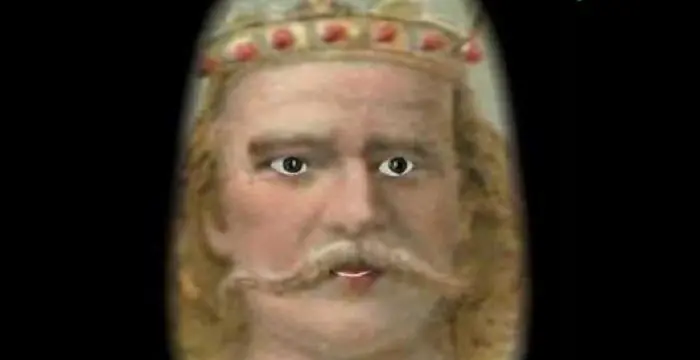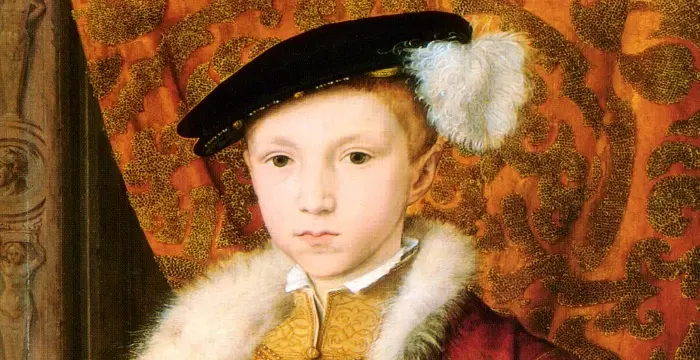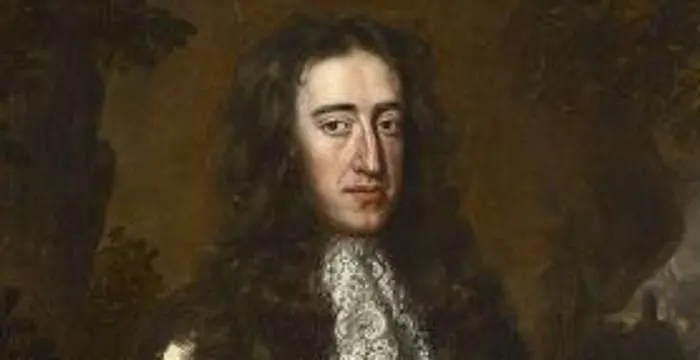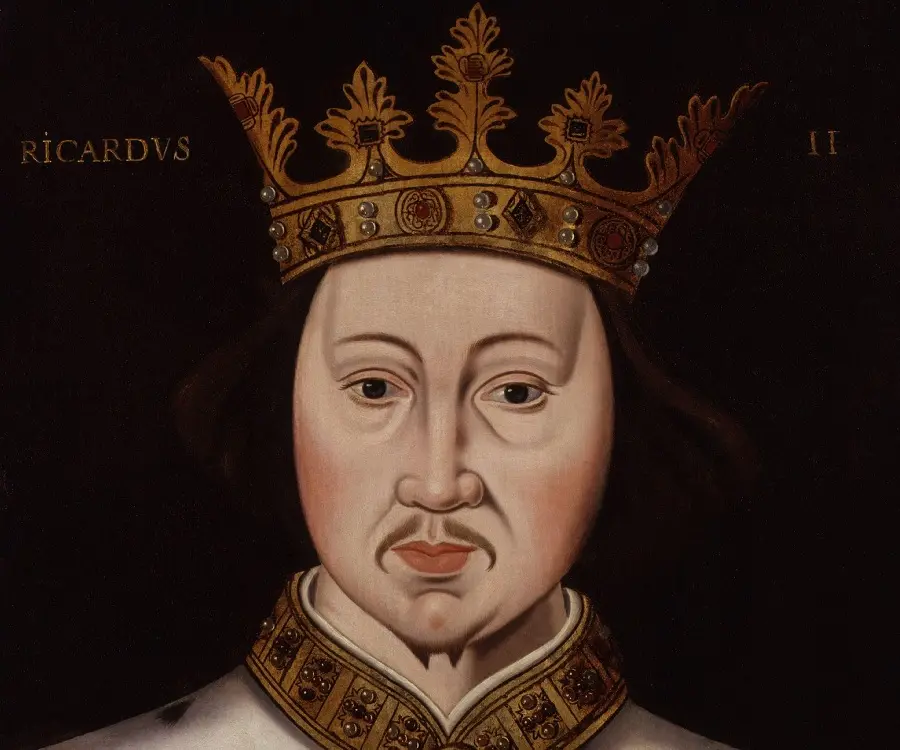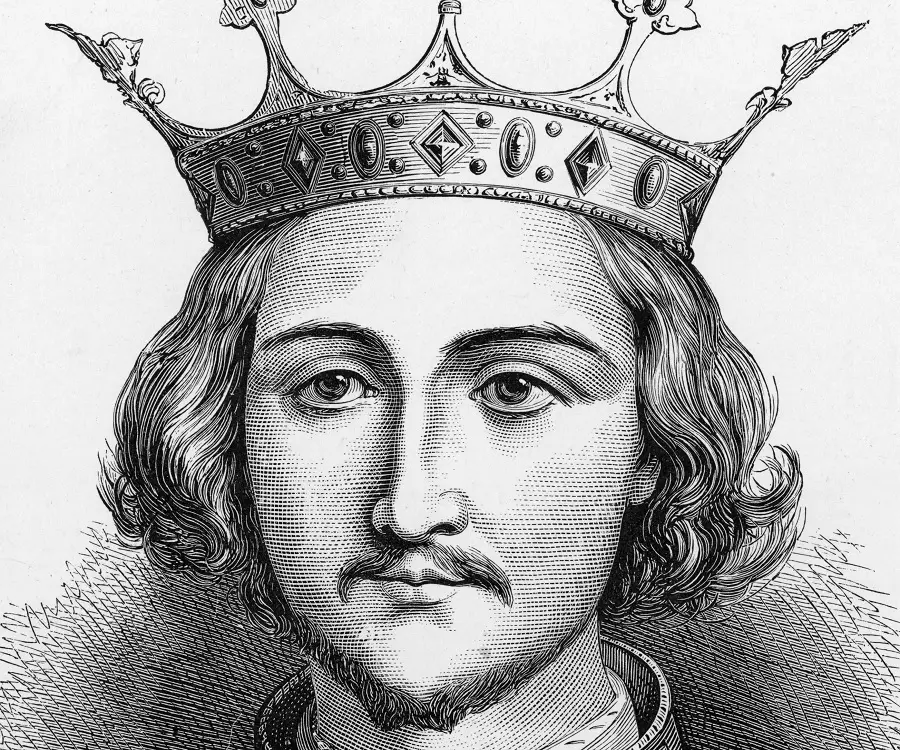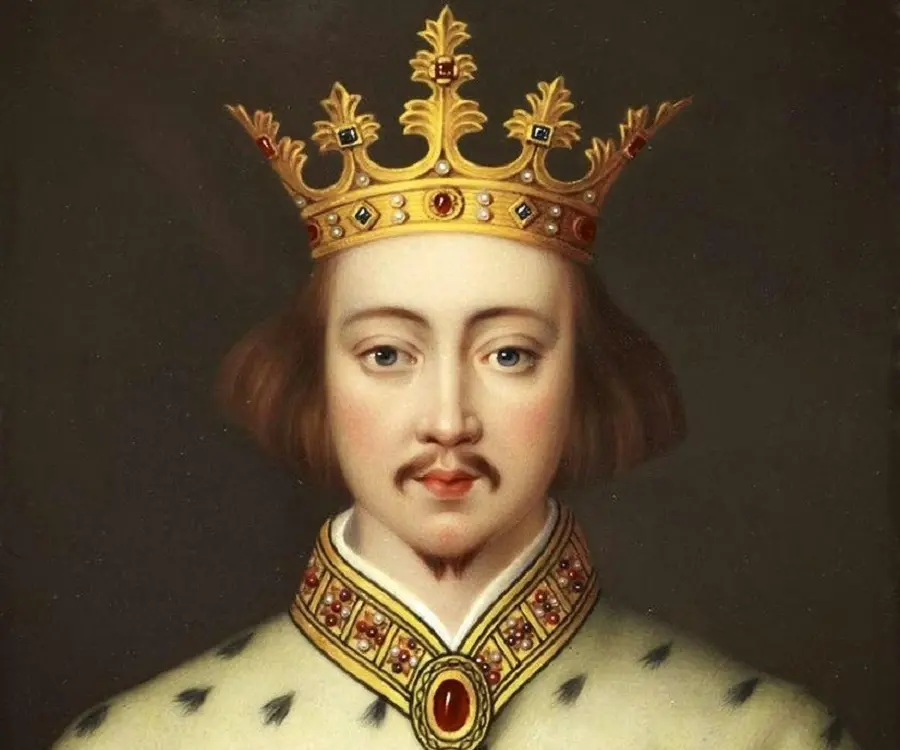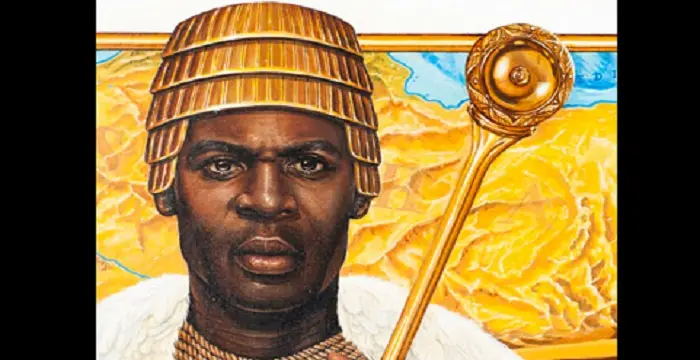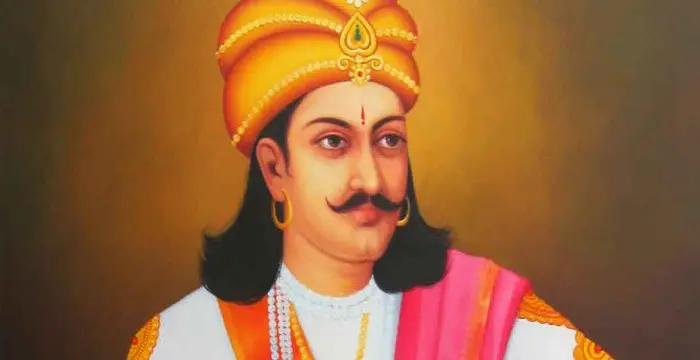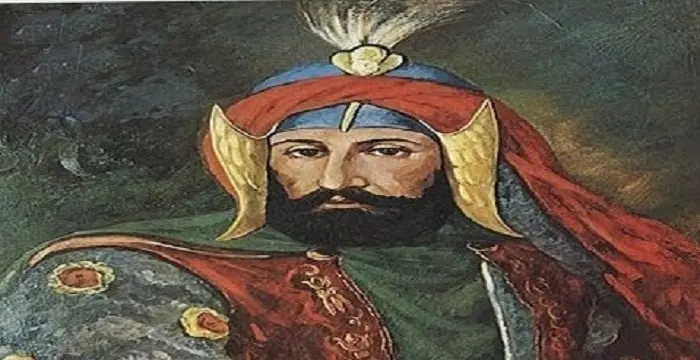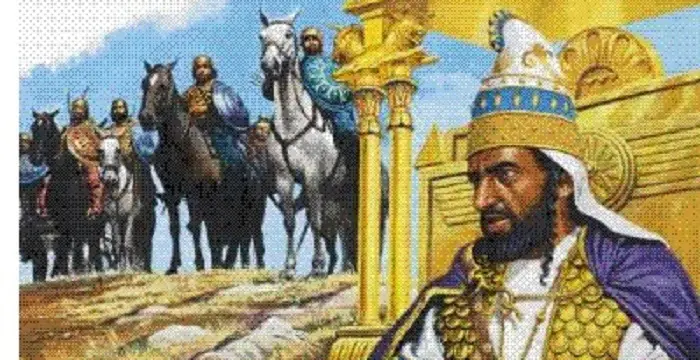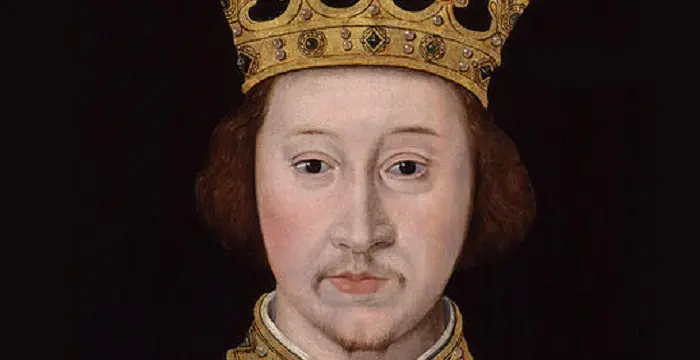
Richard II of England - Kings, Life Achievements and Family
Richard II of England's Personal Details
Richard II was the King of England from 1377 to 1399
| Information | Detail |
|---|---|
| Birthday | January 6, 1367 |
| Died on | February 14, 1400 |
| Nationality | French, British |
| Famous | Historical Personalities, Emperors & Kings, Emperors, King of England, Kings |
| Spouses | Anne of Bohemia, Isabella of Valois |
| Siblings | 1st Duke of Exeter, Edward of Angoulême, John Holland |
| Birth Place | Bordeaux |
| Born Country | France |
| Gender | Male |
| Father | Edward, the Black Prince |
| Mother | Joan of Kent |
| Sun Sign | Capricorn |
| Born in | Bordeaux |
| Famous as | King of England |
| Died at Age | 33 |
// Famous King of England
Harold Godwinson
Harold Godwinson was an Anglo Saxon King of England in the 11th Century. Check out this biography to know about his birthday, childhood, family life, achievements and fun facts about him.
Edward VI of England
Edward VI served as the King of England, from 1547 until his death in 1553. Check out this biography to learn in details about his life, his works as a king and timeline
William III of England
William III was the stadtholder of the main provinces of the Dutch Republic and the king of England, Ireland, and Scotland (King William II of Scotland). Check out this biography to know more about his childhood, family, life history, etc.
Richard II of England's photo
Who is Richard II of England?
Richard II was the King of England from 1377 to 1399. Also known as Richard of Bordeaux, he was an ambitious king with great political aspirations. His reign was marked by several political upheavals and the early years of his reign were overshadowed by the Hundred Years’ War and a prolonged struggle with France. Richard was one of the sons of Edward, the Black Prince and was born during the reign of his grandfather, Edward III. His father was the heir apparent to succeed to the throne held by his grandfather but the untimely death of Edward the Black Prince made Richard the first in line for the throne. His grandfather died in 1377 and Richard, aged just ten at the time, succeeded to the throne. Due to his young age, the control of the government was placed in the hands of a series of councils, and the young king’s uncle, John of Gaunt became a highly influential person in the English court. Richard was just a teenager when he faced his first major challenge as the king—the Peasants’ Revolt. He played a key role in the suppression of this revolt and earned the respect of his citizens. Eventually he assumed the control of government himself but his growing dependency on a small group of courtiers made him unpopular. He was finally deposed by his cousin Henry of Bolingbroke who took the throne of England for himself
// Famous Emperors
Sundiata Keita
Sundiata Keita was the founder of the Mali Empire in West Africa. This biography profiles his childhood, early life, struggles, founding of empire, rule, administration, achievements and also gives some fun facts.
Ashoka
Ashoka was the third emperor of the Mauryan Dynasty and ruled almost the entire Indian subcontinent. This biography profiles his childhood, life, reign, achievements and timeline
Murad IV
Murad IV was one of the mighty Sultans in the history of the Ottoman Empire. This biography profiles his childhood, family, accession, rule, administration and timeline.
Childhood & Early Life
Richard of Bordeaux was born as the younger son of Edward, the Black Prince, and Joan of Kent on 6 January 1367 in Bordeaux, Duchy of Aquitaine. His father Edward was the heir to the throne of England and his grandfather Edward III was the reigning King of England at the time of his Richard’s birth.
Richard’s elder brother Edward of Angoulême died in 1371 and thus Richard became the second-in-line to the throne.
His father Edward, the Black Prince became, ill and died in 1376. Richard was just nine years old at that time and the parliament feared that Richard’s uncle, John of Gaunt, would usurp the throne. Thus Richard was quickly invested with the princedom of Wales and his father's other titles.
Accession & Reign
King Edward III died in June 1377, and Richard, aged just ten, was crowned the king on 16 July 1377. Again it was feared that John of Gaunt might try to take over the power and thus regency led by the young king's uncle was avoided. Even though the regency was avoided, the uncle still exercised considerable influence in the governance.
The king ruled with the help of a group of councilors, and two of them particularly, Sir Simon de Burley and Robert de Vere, Duke of Ireland, increasingly gained control of royal affairs.
The Hundred Years’ War between England and France was going on when Richard ascended to the throne. In order to fund the war, heavy poll taxes were levied on the citizens, thus leading to discontent among the common people.
The growing discontent sparked the Peasants’ Revolt in 1381 which was led by Wat Tyler, John Ball and Jack Straw. Many high officials were killed and the rebellion was moving out of control when Richard, just 14 years old at that time, decided to negotiate with the rebels.
The king met the rebel leaders and agreed to their demands, but the rebels continued their looting and killings. Thus the king decided to suppress the rebellion, and in a display of great valor and courage defeated the rebels and ended the revolt. The bravery and confidence displayed by Richard at such a young age earned him the respect of the citizens.
Eventually Richard assumed the complete control of his kingdom as he came of age. However, he also became too dependent on a small group of councilors who began to enjoy great influence over him. One of them was Michael de la Pole whom Richard made the chancellor in 1383. Another one of the king’s favorites was Robert de Vere, Earl of Oxford.
The 1380s saw a rise in England’s military struggles with France and the threat of a French invasion grew stronger in 1386. This led to a major crisis in Parliament. Michael de la Pole as the chancellor requested for another major taxation to fund the military expeditions. In response, the parliament asked the king to remove the chancellor and threatened him with deposition in case he refused. Thus Richard was forced to remove de la Pole.
In 1387, the control of the government was taken over by a group of aristocrats known as the Lords Appellant. The Lords Appellant launched an armed rebellion against King Richard and defeated an army under Robert de Vere. Then they purged the court and sentenced two of the king’s favorites—de Vere and de la Pole—to death along with several others.
Richard regained his power eventually and in 1389 he reasserted his authority and eliminated the principal members of the Lords Appellant. He ruled the next eight years in relative peace.
England reached a truce with the French in 1396 and this eased the burden of taxation on the general masses.
By this time Richard had matured as a leader and no longer showered all his trust on a small group of people. However, in his quest to be assertive, he became a tyrannical and autocratic ruler and the citizens grew disillusioned with his kingship.
His uncle John of Gaunt died in 1399, and Richard disinherited Gaunt's son, Henry of Bolingbroke, from the vast Lancastrian estates which would have passed to Bolingbroke.
Infuriated, Henry of Bolingbroke invaded England and easily deposed Richard who surrendered without a fight. Following this, Richard was imprisoned and Bolingbroke ascended the throne as Henry IV.
Personal Life & Legacy
Richard married Anne of Bohemia, daughter of the Holy Roman Emperor (King of Bohemia Charles IV) and his wife Elisabeth of Pomerania, in 1382. He deeply loved his wife and was devastated by her death in 1394. This marriage produced no children.
His second marriage was a political alliance, a part of the truce with France. In 1396, he married Isabella, daughter of Charles VI of France. The princess was just a child of six at the time of the marriage.
Richard was imprisoned in Pontefract Castle following his deposition and he died in captivity on 14 February 1400. Some sources suggest that he was starved to death though the cause of his death is not clear.
// Famous Kings
Sundiata Keita
Sundiata Keita was the founder of the Mali Empire in West Africa. This biography profiles his childhood, early life, struggles, founding of empire, rule, administration, achievements and also gives some fun facts.
Ashoka
Ashoka was the third emperor of the Mauryan Dynasty and ruled almost the entire Indian subcontinent. This biography profiles his childhood, life, reign, achievements and timeline
Murad IV
Murad IV was one of the mighty Sultans in the history of the Ottoman Empire. This biography profiles his childhood, family, accession, rule, administration and timeline.
Richard II of England biography timelines
- // 6th Jan 1367Richard of Bordeaux was born as the younger son of Edward, the Black Prince, and Joan of Kent on 6 January 1367 in Bordeaux, Duchy of Aquitaine. His father Edward was the heir to the throne of England and his grandfather Edward III was the reigning King of England at the time of his Richard’s birth.
- // 1371Richard’s elder brother Edward of Angoulême died in 1371 and thus Richard became the second-in-line to the throne.
- // 1376His father Edward, the Black Prince became, ill and died in 1376. Richard was just nine years old at that time and the parliament feared that Richard’s uncle, John of Gaunt, would usurp the throne. Thus Richard was quickly invested with the princedom of Wales and his father's other titles.
- // 16th Jul 1377King Edward III died in June 1377, and Richard, aged just ten, was crowned the king on 16 July 1377. Again it was feared that John of Gaunt might try to take over the power and thus regency led by the young king's uncle was avoided. Even though the regency was avoided, the uncle still exercised considerable influence in the governance.
- // 1381The growing discontent sparked the Peasants’ Revolt in 1381 which was led by Wat Tyler, John Ball and Jack Straw. Many high officials were killed and the rebellion was moving out of control when Richard, just 14 years old at that time, decided to negotiate with the rebels.
- // 1382 To 1394Richard married Anne of Bohemia, daughter of the Holy Roman Emperor (King of Bohemia Charles IV) and his wife Elisabeth of Pomerania, in 1382. He deeply loved his wife and was devastated by her death in 1394. This marriage produced no children.
- // 1383Eventually Richard assumed the complete control of his kingdom as he came of age. However, he also became too dependent on a small group of councilors who began to enjoy great influence over him. One of them was Michael de la Pole whom Richard made the chancellor in 1383. Another one of the king’s favorites was Robert de Vere, Earl of Oxford.
- // 1386The 1380s saw a rise in England’s military struggles with France and the threat of a French invasion grew stronger in 1386. This led to a major crisis in Parliament. Michael de la Pole as the chancellor requested for another major taxation to fund the military expeditions. In response, the parliament asked the king to remove the chancellor and threatened him with deposition in case he refused. Thus Richard was forced to remove de la Pole.
- // 1387In 1387, the control of the government was taken over by a group of aristocrats known as the Lords Appellant. The Lords Appellant launched an armed rebellion against King Richard and defeated an army under Robert de Vere. Then they purged the court and sentenced two of the king’s favorites—de Vere and de la Pole—to death along with several others.
- // 1389Richard regained his power eventually and in 1389 he reasserted his authority and eliminated the principal members of the Lords Appellant. He ruled the next eight years in relative peace.
- // 1396England reached a truce with the French in 1396 and this eased the burden of taxation on the general masses.
- // 1396His second marriage was a political alliance, a part of the truce with France. In 1396, he married Isabella, daughter of Charles VI of France. The princess was just a child of six at the time of the marriage.
- // 1399His uncle John of Gaunt died in 1399, and Richard disinherited Gaunt's son, Henry of Bolingbroke, from the vast Lancastrian estates which would have passed to Bolingbroke.
- // 14th Feb 1400Richard was imprisoned in Pontefract Castle following his deposition and he died in captivity on 14 February 1400. Some sources suggest that he was starved to death though the cause of his death is not clear.
// Famous Historical Personalities
Sundiata Keita
Sundiata Keita was the founder of the Mali Empire in West Africa. This biography profiles his childhood, early life, struggles, founding of empire, rule, administration, achievements and also gives some fun facts.
Ashoka
Ashoka was the third emperor of the Mauryan Dynasty and ruled almost the entire Indian subcontinent. This biography profiles his childhood, life, reign, achievements and timeline
Jetsun Pema
Jetsun Pema is the Queen consort of Bhutan. Check out this biography to know about her childhood, family life, achievements and fun facts about her life.
Murad IV
Murad IV was one of the mighty Sultans in the history of the Ottoman Empire. This biography profiles his childhood, family, accession, rule, administration and timeline.
Xerxes I
Xerxes I (Xerxes the Great) was the fourth and the most famous king of the Archaemenid dynasty of Persia. This biography profiles his childhood, family, personal life, life history, achievements, campaigns, administration, death and other facts.
Sargon of Akkad
Sargon of Akkad, also called ‘Sargon the Great’, ‘Sarru-Kan’ and ‘Shar-Gani-Sharri’, was the founder and first king of the Akkadian Empire. This biography profiles his childhood, life, rule, administration, timeline, and gives some fun facts.
Richard II of England's FAQ
What is Richard II of England birthday?
Richard II of England was born at 1367-01-06
When was Richard II of England died?
Richard II of England was died at 1400-02-14
Where was Richard II of England died?
Richard II of England was died in Pontefract Castle
Which age was Richard II of England died?
Richard II of England was died at age 33
Where is Richard II of England's birth place?
Richard II of England was born in Bordeaux
What is Richard II of England nationalities?
Richard II of England's nationalities is French, British
Who is Richard II of England spouses?
Richard II of England's spouses is Anne of Bohemia, Isabella of Valois
Who is Richard II of England siblings?
Richard II of England's siblings is 1st Duke of Exeter, Edward of Angoulême, John Holland
Who is Richard II of England's father?
Richard II of England's father is Edward, the Black Prince
Who is Richard II of England's mother?
Richard II of England's mother is Joan of Kent
What is Richard II of England's sun sign?
Richard II of England is Capricorn
How famous is Richard II of England?
Richard II of England is famouse as King of England
